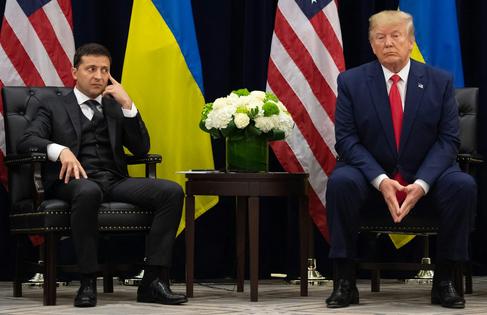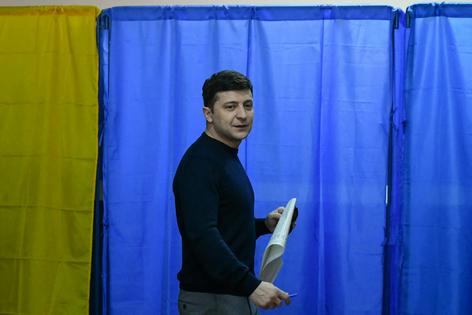In pushing for Ukraine elections, Trump is falling into Putin-laid trap to delegitimize Zelenskyy
Published in Political News
Ukraine President Volodymyr Zelenskyy was shut out of the discussions concerning the future of his country, which took place in Saudi Arabia on Feb. 18, 2025. In fact, there were no Ukrainian representatives, nor any European Union ones – just U.S. and Russian delegations, and their Saudi hosts.
The meeting – which followed a mutually complimentary phone call between U.S. President Donald Trump and Russian leader Vladimir Putin just days earlier – was gleefully celebrated in Moscow. The absence of Ukraine in deciding its own future is very much in line with Putin’s policy toward its neighbor. Putin has long rejected Ukrainian statehood and the legitimacy of the Ukrainian government, or as he calls it the “Kyiv regime.”
While the U.S. delegation did reiterate that future discussions would have to involve Ukraine at some stage, the Trump administration’s actions and words have no doubt undermined Kyiv’s position and influence.
To that end, the U.S. is increasingly falling in line with Moscow on a key plank of the Kremlin’s plan to delegitimize Zelenskyy and the Ukrainian government: calling for elections in Ukraine as part of any peace deal.
Challenging Zelenskyy’s legitimacy is part of a deliberate ongoing propaganda campaign by Russia to discredit Ukrainian leadership, weaken support for Ukraine from its key allies and remove Zelenskyy – and potentially Ukraine – as a partner in negotiations.
Claims by the Russian president that his country is ready for peace negotiations appear, to many observers of its three-year war, highly suspect given Russia’s ongoing attacks on its neighbor and its steadfast refusal to date to agree to any temporary truce.
Yet the Kremlin is pushing the narrative that the problem is that there is no legitimate Ukrainian authority with which it can deal. As such, Putin can proclaim his commitments to a peace without making any commitments or compromises necessary to any true negotiation process.
Meanwhile, painting Zelenskyy as a “dictator” dampens the enthusiastic support that once greeted him from democratic countries. This, is turn, can translate to the reduction or even end of military support for Kyiv, Putin hopes, allowing him a fillip in what has become a war of attrition.
What Putin needs for this plan to work is a willing partner to help get the message out that Zelenskyy and the current Ukraine government are not legitimate representatives of their country – and into this gap the new U.S. administration appears to have stepped.
Take the narrative on elections.
At the meeting in Saudi Arabia, the U.S. reportedly discussed elections in Ukraine as being a key part of any peace deal. Trump himself has raised the prospect of elections, noting in a Feb. 18 press conference: “We have a situation where we haven’t had elections in Ukraine, where we have martial law.” The U.S. president went on to claim, incorrectly, that Zelenskyy’s approval rating was down to “4%.” The latest polling actually shows the Ukrainian president to be sitting on a 57% approval rating.
A day later, Trump upped the attacks, describing Zelenskyy as a “dictator without elections.”
Such statements echo Russia’s narrative that the government in Kyiv is illegitimate.
The Kremlin’s claims regarding what it describes as the “legal aspects related to his [Zelenskyy’s] legitimacy” are based on the premise that the Ukraine president’s five-year term as president of Ukraine should have ended in 2024.
And elections in Ukraine would have taken place in May of that year had it not been for the martial law that Ukraine put into place when the Russian Federation launched a full-scale invasion of Ukraine in February 2022.
The Martial Law Act – which Ukraine imposed on Feb. 24, 2022 – explicitly bans all elections in Ukraine for the duration of the emergency action.
And while the Ukrainian Constitution only includes language regarding the extension of parliament’s powers until martial law is lifted, constitutional lawyers in Ukraine tend to agree that the implication is that this also applies to presidential powers.
Notwithstanding what the law says, the Kremlin’s questioning of the democratic institutions of Ukraine and its push for elections in Ukraine have found traction in Washington of late. Trump’s special envoy Gen. Keith Kellogg declared on Feb. 1 that elections “need to be done” as part of peace process, saying that elections are a “beauty of a solid democracy.”
Zelenskyy is not opposed to elections in principle and has agreed that elections should be held when the time is right. “Once martial law is over, then the ball is in parliament’s court – the parliament then picks a date for elections,” Zelenskyy stated in a Jan. 2 interview.
And he appears to have the backing of the majority of Ukrainians. In May 2024, 69% of Ukrainians polled said Zelenskyy should remain president until the end of marshal law, after which elections should be held.
The issue, as Zelenskyy has said, is the timing and circumstances. “During the war, there can be no elections. It’s necessary to change legislation, the constitution, and so on. These are significant challenges. But there are also nonlegal, very human challenges,” he said on Jan. 4.
Even opposition politicians in Ukraine agree that now is not the time. Petro Poroshenko, Zelenskyy’s main political rival, has dismissed the idea of wartime elections, as has Inna Sovsun, the leader of the opposition Golos Party.
Apart from logistical problems of ensuring free and fair elections in the middle of a war, the conflict would present logistical hurdles to campaigning and accessing polling sites. There is also the question of whether and how to include Ukrainians in Russian-occupied territories and those who are internally displaced, as well as the 6.5 million who fled fighting and currently reside abroad.
Russia did, of course, hold elections during the current conflict. But the 2024 election that Putin won with 87% of the vote was, according to most international observers, neither free nor fair.
Rather, it was a sham vote that only underlined what most political scientists will confirm: Elections are at best a necessary but insufficient marker of democracy.
This point is not wasted on Ukrainians, whose commitment to democracy strengthened in the years leading up to the 2022 invasion. Indeed, a survey taken a few months into the war found that 76% of Ukrainians agreed that democracy was the best form of governance – up from 41% three years earlier.
There are other reasons Ukraine might be wary of elections. The adversarial nature of political campaigns can be divisive, especially among a society in high stress.
Ukrainian politicians have openly argued that holding an election during the war would be destabilizing for Ukrainian society, undermining the internal unity in face of Russian aggression.
And then there is concern over outside influence in any election. Ukrainians have had enough experience with Russian meddling in their politics to take it for granted that the Kremlin will attempt to put a thumb on the scale.
Russia has since the breakup of the Soviet Union in 1991 employed its substantial resources to influence Ukraine’s politics through all available means, ranging from propaganda, economic pressures and incentives to energy blackmail, threats and use of violence.
In 2004, Moscow’s electoral manipulations in favor of the pro-Russian candidate, Viktor Yanukovich, led to the Orange Revolution – in which Ukrainians rose up to reject rigged elections. Nine years later, Yanukovich – who became president in 2010 – was deposed though the Revolution of Dignity, which saw Ukrainians oust a man many saw as a Russian stooge in favor of a path toward greater integration with Europe.
Putin’s history of meddling in elections extends beyond Ukraine, of course. Most recently, the Romanian Constitutional Court annulled the country’s presidential elections, citing an electoral process compromised by foreign interference.
In raising elections as a prerequisite to negotiations, Putin is setting a “catch-22” trap for Ukraine: The Ukrainian Constitution states that elections can happen only when martial law is lifted; but the lifting of the martial law is possible only when the “hot phase” of the war is over. So without a ceasefire, no election is possible.
But in refusing to agree to elections, Ukraine can be cast as the blockage to any peace deal – playing to a narrative that is already forming in the U.S. administration that Kyiv is the problem and will need to be sidelined for there to be progress.
In short, in seemingly echoing Russian talking points on an election being a prerequisite for peace, the U.S. puts the Ukrainian government in an impossible position: Agree to the vote and risk internal division and outside interference, or reject it and allow Moscow – and, perhaps, Washington – to frame Ukraine’s leaders as illegitimate and unable to negotiate on the behalf of their people.
This article is republished from The Conversation, a nonprofit, independent news organization bringing you facts and trustworthy analysis to help you make sense of our complex world. It was written by: Lena Surzhko Harned, Penn State
Read more:
Trump wants to do a deal for Ukraine’s critical minerals. Will Zelensky give him what he wants – or will Putin?
Ukraine peace talks: Trump is bringing Russia back in from the cold and ticking off items on Putin’s wish list
Trolling feels like a new phenomenon. But it existed long before the internet
Lena Surzhko Harned does not work for, consult, own shares in or receive funding from any company or organization that would benefit from this article, and has disclosed no relevant affiliations beyond their academic appointment.
































































Comments